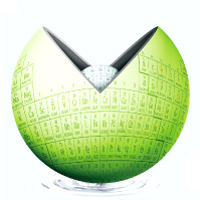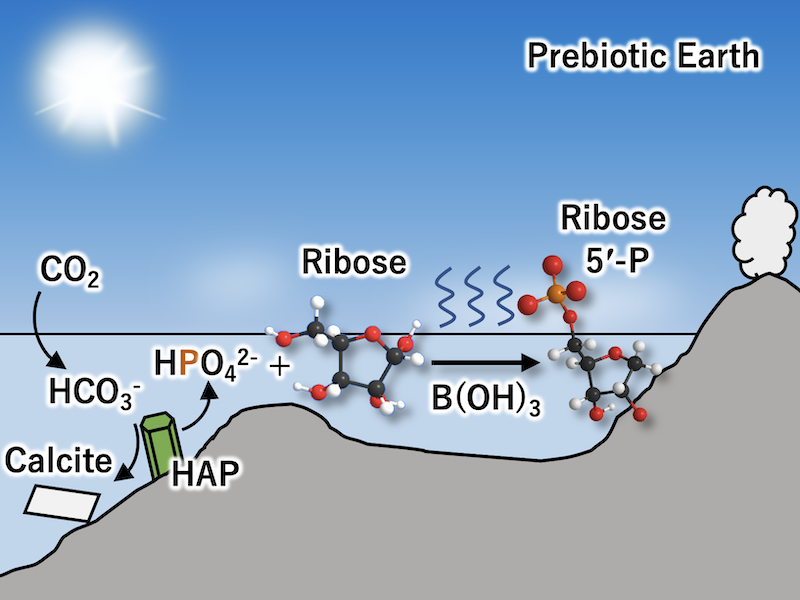
Abiotic formation of ribose 5'-phosphate from ribose and apatite with carbonate- and formate-rich solutions
ABSTRACT

The spontaneous formation of ribonucleotides on prebiotic Earth is considered an essential step in the origin of life. Phosphorylation of ribose to form ribose 5'-phosphate with boric acid has been reported as a key step in ribonucleotide synthesis. However, the probability of phosphorylation of ribose with mineral phosphate, which is the most abundant form of phosphate on Earth, remains unclear. Carbonate and formate were both widely available compounds on prebiotic Earth and are known to increase the solubility of mineral phosphates. Therefore, the present study investigates the phosphorylation of ribose with apatite in the presence of carbonate or formate. Ribose was phosphorylated preferentially at 5'-hydroxyl when slightly alkaline ribose solution was dried down with hydroxyapatite, urea, boric acid, and formate or carbonate at 80°C for 24 h. Conversely, the yield was limited to less than 10% in the absence of formate and carbonate at the same pH. Dissolution of apatite was substantially increased in the presence of carbonate and formate, allowing the phosphorylation of ribose. These results suggest that ribose 5'-phosphate may have been spontaneously formed in boron-rich evaporative environments on prebiotic earth, expanding the availability of ribonucleotides on prebiotic Earth in addition to the conventional process through ribonucleosides.
KEYWORDS
Keywords: phosphorylation, ribose, apatite, carbonate, formate- Published : 2023
- Released on J-STAGE : 2023/09/27
- Received : 2023/04/06
- Accepted : 2023/07/17
- DOI : https://doi.org/10.2343/geochemj.GJ23012
- J-STAGE URL : https://www.jstage.jst.go.jp/article/geochemj/57/5/57_GJ23012/_article
- J-Online ISSN: 1880-5973
- Print ISSN : 0016-7002
- ISSN-L : 0016-7002
All Issues
- Vol.59, 2025
- Vol.58, 2024
- Vol.57, 2023
- Vol.56, 2022
- Vol.55, 2021
- Vol.54, 2020
- Vol.53, 2019
- Vol.52, 2018
- Vol.51, 2017
- Vol.50, 2016
- Vol.49, 2015
- Vol.48, 2014
- Vol.47, 2013
- Vol.46, 2012
- Vol.45, 2011
- Vol.44, 2010
- Vol.43, 2009
- Vol.42, 2008
- Vol.41, 2007
- Vol.40, 2006
- Vol.39, 2005
- Vol.38, 2004
- Vol.37, 2003
- Vol.36, 2002
- Vol.35, 2001
- Vol.34, 2000
- Vol.33, 1999
- Vol.32, 1998
- Vol.31, 1997
- Vol.30, 1996
- Vol.29, 1995
- Vol.28, 1994
- Vol.27, 1993
- Vol.26, 1992
- Vol.25, 1991
- Vol.24, 1990
- Vol.23, 1989
- Vol.22, 1988
- Vol.21, 1987
- Vol.20, 1986
- Vol.19, 1985-1986
- Vol.18, 1984
- Vol.17, 1983
- Vol.16, 1982
- Vol.15, 1981
- Vol.14, 1980
- Vol.13, 1979
- Vol.12, 1978
- Vol.11, 1977
- Vol.10, 1976
- Vol.9, 1975
- Vol.8, 1974
- Vol.7, 1973
- Vol.6, 1972-1973
- Vol.5, 1971
- Vol.4, 1970-1971
- Vol.3, 1969-1970
- Vol.2, 1968
- Vol.1, 1966-1967




